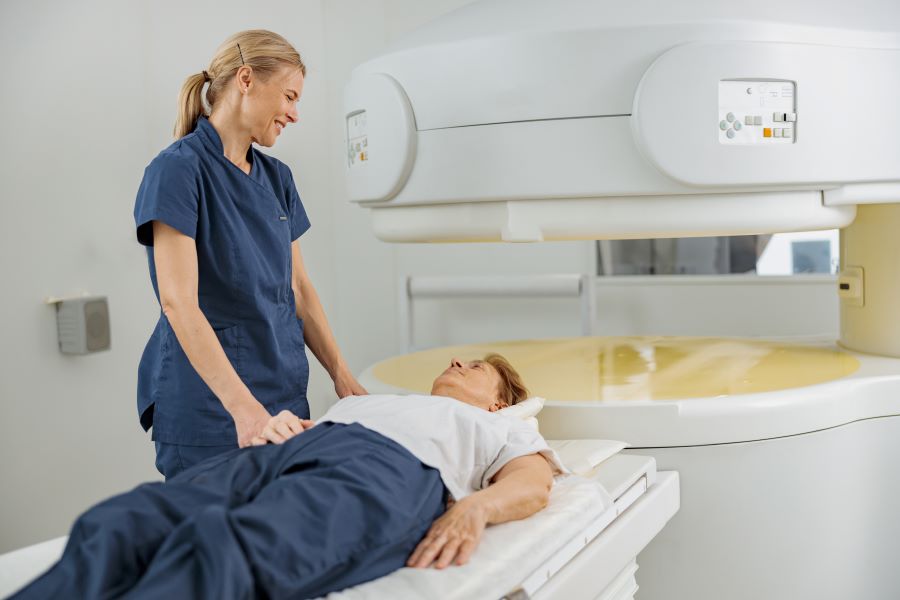Can Lyme disease trigger a cascade of costly, unnecessary tests?

In an article published in JAMA Internal Medicine, Dr. Meredith Niess described a case where routine medical tests triggered a cascade of costly, unnecessary care.
Dr. Meredith Niess discussed the case in more detail in an NPR story.[1] A man was scheduled for hernia surgery. A preoperative X-ray was ordered despite the paucity of evidence of whether the X-ray was needed. The X-ray suggested a mass. The patient was worried about cancer.
Cancer was ruled out. “In fact, a follow-up CT scan showed a clean lung but picked up another suspicious “something” in the patient’s adrenal gland,” stated Neiss. The second CT scan was negative.
Niess used the case “as an example of what researchers call a “cascade of care” — a seemingly unstoppable series of medical tests or procedures.”
This cascade effect has been described before. “With regard to medical technology, the term refers to a chain of events initiated by an unnecessary test, an unexpected result, or patient or physician anxiety, which results in ill-advised tests or treatments that may cause avoidable adverse effects and/or morbidity,” wrote Deyo.[2]
Deyo cited an example of a cascade effect in his review from the professionals who coined the term.
Mold & Stein offered the story of a patient admitted to the hospital for elective repair of an inguinal hernia.[3] “He had a history of coronary disease with very mild arterial narrowing on a previous cardiac catheterization. Anxious about his cardiac status, the surgeons requested a preoperative cardiology consultation. Perhaps uncertain about his own clinical judgment, the cardiologist suggested obtaining an exercise tolerance test.
This was delayed for six hours while the patient waited outside the test room, during which time he became anxious, agitated, and angry, and had some mild chest discomfort. Because of the chest discomfort, the test was not done and the patient was transferred to a telemetry unit. There he became more anxious and agitated, was found to have some electrocardiogram changes, and received medications.
He underwent another cardiac catheterization, which actually showed slight improvement since his previous test. At that point, the hernia repair could not be performed because of a full operating room schedule, and the primary physician was left to try to reassure the patient that he was in no danger. The procedure had to be delayed for two weeks.
In this example, the chain of events seemed to be fueled by physician anxiety, and it snowballed with the addition of patient anxiety.”
Cascade of tests for Lyme disease patients
In some cases, Lyme disease may go undiagnosed and with its broad array of symptoms and presentations can trigger a cascade of costly, unnecessary tests.
Misdiagnosis and delayed diagnosis have been described in a large Lyme disease database. “More than half (51%) reported that it took them more than three years to be diagnosed and roughly the same proportion (54%) saw five or more clinicians before diagnosis. These diagnostic delays occurred despite the fact that 45% of participants reported early symptoms of Lyme disease within days to weeks of exposure,” wrote Johnson et al. [4]
Others with recurrent Lyme disease and Lyme encephalopathy have waited an average of 2 years before receiving treatment.[5,6]
These delays can have life-long repercussions. Once the Borrelia burgdorferi (Bb) infection disseminates, symptoms can become more problematic and treatment more difficult.
Related Articles:
What does a Lyme disease flare-up feel like?
Herxheimer reaction in a 13-year-old boy with Lyme disease
Lyme disease causes a mix of symptoms including autonomic dysfunction
References:
- When routine medical tests trigger a cascade of costly, unnecessary care. https://www.npr.org/sections/health-shots/2022/06/13/1104141886/cascade-of-care
- Deyo RA. Cascade effects of medical technology. Annu Rev Public Health. 2002;23:23-44. doi:10.1146/annurev.publhealth.23.092101.134534
- Mold JW, Stein HF. The cascade effect in the clinical care of patients. N Engl J Med. Feb 20 1986;314(8):512-4. doi:10.1056/NEJM198602203140809
- Johnson L, Shapiro M, Mankoff J. Removing the Mask of Average Treatment Effects in Chronic Lyme Disease Research Using Big Data and Subgroup Analysis. Healthcare (Basel). Oct 12 2018;6(4)doi:10.3390/healthcare6040124
- Fallon BA, Keilp JG, Corbera KM, et al. A randomized, placebo-controlled trial of repeated IV antibiotic therapy for Lyme encephalopathy. Neurology. Mar 25 2008;70(13):992-1003. doi:10.1212/01.WNL.0000284604.61160.2d
- Cameron DJ. Consequences of treatment delay in Lyme disease. J Eval Clin Pract. Jun 2007;13(3):470-2. doi:10.1111/j.1365-2753.2006.00734.x




catherine muldoon
08/30/2023 (5:40 pm)
Me my disabled daughter got bit by a fly 5 years ago the start she lost her sight in one eye I think I’m at death stage now the sever headaches body tremors jerks loss of weight we don’t get out of bed no more I was told it was in my mind I had pycosis why do medical turn the back but the worst the last 2 years my daughter has to fight for her life being in hospital 6 months sepsis shock pheumonia RSV just had a stint back in hospital systemic sepsis shock she had multiple organ failure &for 5 years iv researched got to the truth myself I know i have parasites in my brain nose throat we still have not been medicated my daughter will carry on getting sick till someone believes us I’m having seizures as well loss control of mouth slobbering don’t know we’re to turn to except the lord id the only one to try keep my daughter safe i think mine to far gone
Dr. Daniel Cameron
08/31/2023 (6:58 am)
I advise anyone or there child with such a broad of issues to keep working with doctors.